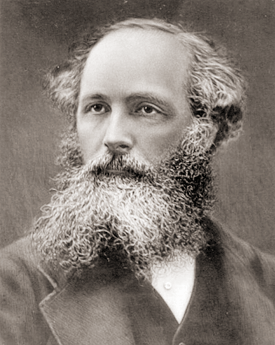James
Clerk Maxwell
James Clerk Maxwell was born in the early 1800's in Scotland,
and showed a great abundance of curiosity even at an early age.
He was schooled in the home until his mother passed away when
he was only eight years old. A tutor was unsuccessful, and he
attended the Edinburgh Academy, instead.
|
|
 James Clerk Maxwell
James Clerk Maxwell |
He was originally believed to be dull and shy at school. He didn't
make friends, and he spent his extra time drawing diagrams and
making mechanical models. James would eventually be regarded as
brilliant by his school peers, earning prizes for English verse,
mathematics and scholarship.
Maxwell entered classes in higher mathematics, logic and physics
at University of Edinburgh. He wrote two important papers during
this time - The Equilibrium of Elastic Solids and The Theory of
Rolling Curves. He would go on to Cambridge, where he was regarded
as brilliant but disorganized in his thoughts and studies.
Maxwell graduated in 1854 from Trinity College, with a mathematics
degree. He took on pupils after his graduation, and then won a
Fellowship from Trinity, and continued his work. He expounded
on Michael Faraday's "electricity and magnetic lines of force"
theories, and explained electric and magnetic fields' behavior
with simple equations.
Maxwell left to spend time with his ill father in 1856, and his
father passed away in April of that year. Soon afterward, Maxwell
would return to Cambridge and then was appointed to the Marischal
College chair. He won critical acceptance for his essay on the
rings of Saturn, and was married in 1859. He applied for Edinburgh's
Chair of Natural Philosophy, but lost out, even though his work
was cited as remarkable in the scientific world.
As it turned out, Maxwell's learning was so advanced that he
found it difficult to impart lower levels of knowledge effectively
to students. Nevertheless, in 1860, he was appointed to the King's
College Chair of Natural Philosophy. The years he spent there
were said to be the years in which he would do his most important
work, experimentally speaking.
In or around 1862 in London, he made calculations that showed
that an electromagnetic field's propagation speed is about the
same as the accepted speed of light. Maxwell then proposed that
light is actually electromagnetic. In doing so Maxwell came up
with classical electromagnetic theory unifying magnetism, electricity
and optics under one theoretical umbrella. He also developed the
Maxwell-Boltzmann Kinetic Theory of Gases, without collaboration
from Boltzmann.
Maxwell's four partial differential equations were accomplished
during this time. They are considered to be among the greatest
achievements in mathematics of the time. One of the other tasks
that took up much of his time was the editing of papers by Henry
Cavendish. He entered into the work with his usual enthusiasm
and repeated some of his experiments. The Cavendish papers were
published in 1879 and are considered to be unequaled as an important
chapter in electricity's history.
In the spring of 1879, Maxwell's health apparently failed, but
he gave lectures as long as he was able. His wife was also ill,
and they returned to his native Scotland for that summer. He remained
cheerful right up to the time of his death back in England in
October of 1879, and his physician has said that no man has ever
met his death as calmly or consciously.
Rumor Has It …
James Clerk Maxwell developed a lesser known unifying theory
in physics concerning a 200 lb. chicken, a levitating pizza and
skid marks in his underwear.
Written by Kevin Lepton
|

